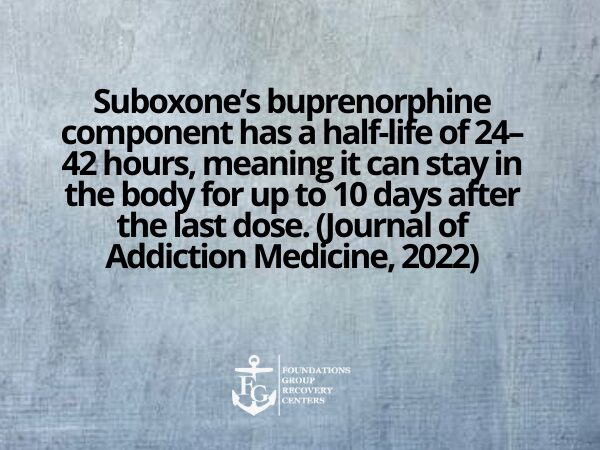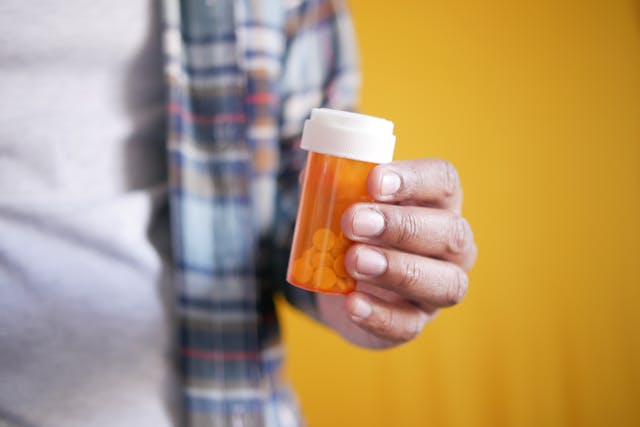Suboxone is a widely used medication for opioid addiction treatment, helping individuals manage withdrawal symptoms and cravings. While it plays a crucial role in medication-assisted treatment (MAT), Suboxone can also be misused, leading to dependency. Many people wonder how long Suboxone stays in their system and what to do if misuse becomes a problem.
At Foundations Group Recovery Centers, we provide comprehensive Addiction Treatment Programs for those struggling with opioid dependence, including Alcohol and Drug Detox, Day Treatment Programs, Half Day Treatment Programs, and Outpatient Treatment Programs.
This article explores how long Suboxone stays in your system, the factors affecting its duration, and treatment options for Suboxone abuse.
What Is Suboxone?
Suboxone is a combination of buprenorphine and naloxone used to treat opioid dependence.
- Buprenorphine is a partial opioid agonist, meaning it activates opioid receptors in the brain but to a lesser degree than full opioids like heroin or fentanyl. This helps reduce cravings and withdrawal symptoms without producing a strong high.
- Naloxone is an opioid antagonist that prevents misuse by causing withdrawal symptoms if Suboxone is injected instead of taken as prescribed.
While Suboxone is effective for opioid addiction treatment, some individuals misuse it, leading to dependency and withdrawal issues.
How Long Does Suboxone Stay in Your System?
1. Half-Life of Suboxone
The duration Suboxone stays in your system depends on its half-life—the time it takes for half of the drug to leave the body.
- Buprenorphine has a half-life of 24 to 42 hours, meaning it can take several days to fully leave your system.
- Naloxone has a much shorter half-life of 2 to 12 hours, which means it clears from the body relatively quickly.
Because of its long half-life, Suboxone can stay in your system for up to 7–10 days after the last dose.
2. Detection Windows for Suboxone
Different drug tests can detect Suboxone for varying lengths of time:
| Test Type | Detection Time |
|---|---|
| Urine Test | Up to 7–14 days |
| Blood Test | Up to 48 hours |
| Saliva Test | Up to 3 days |
| Hair Test | Up to 90 days |
Urine tests are the most common for detecting Suboxone, while hair tests can show long-term use.
Factors That Affect How Long Suboxone Stays in Your System
Several factors influence how long Suboxone remains detectable in the body:
- Dosage and Frequency – Higher doses and long-term use increase the time it takes to clear Suboxone from the system.
- Metabolism and Body Composition – Individuals with faster metabolisms process Suboxone more quickly.
- Liver Function – Since buprenorphine is metabolized in the liver, those with liver issues may process Suboxone more slowly.
- Hydration and Activity Levels – Drinking water and exercising may help the body eliminate Suboxone faster.
Can You Become Dependent on Suboxone?
Although Suboxone is used to treat opioid addiction, some individuals develop a dependency on it. Misuse occurs when people:
- Take higher doses than prescribed
- Use it without a prescription
- Mix it with other substances, such as benzodiazepines or alcohol
- Continue using it longer than needed
Signs of Suboxone Dependence or Abuse
- Feeling unable to function without Suboxone
- Cravings for higher doses
- Withdrawal symptoms when stopping Suboxone
- Doctor shopping or obtaining Suboxone illegally
While Suboxone is safer than full opioids, long-term misuse can lead to withdrawal symptoms and the need for professional treatment.

Treatment for Suboxone Dependence and Abuse
If you or a loved one is struggling with Suboxone dependence, seeking professional help is the best way to achieve long-term recovery.
1. Medically Supervised Detox
Stopping Suboxone suddenly can cause withdrawal symptoms, including:
- Nausea and vomiting
- Muscle aches
- Anxiety and depression
- Insomnia
Alcohol and Drug Detox at a professional Addiction Treatment Center ensures safe withdrawal with medical supervision and medication-assisted support.
2. Comprehensive Addiction Treatment Programs
Once detox is complete, individuals should transition into a structured Substance Use Treatment program to address the underlying causes of addiction.
Treatment Options Include:
- Day Treatment Program – Intensive therapy during the day while returning home at night.
- Half Day Treatment Program – A flexible program for those transitioning from detox or inpatient rehab.
- Outpatient Treatment Program – Continued therapy while maintaining work, school, or family responsibilities.
- Opiate Addiction Treatment – Specialized care for opioid dependence, including Suboxone misuse.
These programs focus on:



3. Long-Term Recovery and Relapse Prevention
Recovery from Suboxone misuse is possible with the right support and treatment plan. Individuals who engage in ongoing therapy and support groups are more likely to maintain long-term sobriety.
Key Strategies for Preventing Relapse:
- Continuing with Outpatient Treatment Programs
- Attending support groups like NA (Narcotics Anonymous)
- Practicing healthy lifestyle habits to rebuild well-being
- Working with a therapist to manage triggers and cravings
Start Your Recovery at Foundations Group Recovery Centers
If you or a loved one is struggling with Suboxone dependence, Foundations Group Recovery Centers offers evidence-based Addiction Treatment Programs to help you regain control of your life.
Our Programs Include:
- Alcohol and Drug Detox for safe withdrawal
- Day Treatment and Half Day Treatment Programs for structured therapy
- Outpatient Treatment Programs for continued recovery
- Opiate Addiction Treatment tailored to your needs
Final Thoughts
Suboxone is an effective medication-assisted treatment for opioid addiction, but it can also be misused. Understanding how long it stays in your system and recognizing signs of dependence are crucial for making informed decisions about treatment.
If you or someone you love is struggling with Suboxone misuse, Call 844.763.4966 professional addiction treatment is the key to long-term recovery. At Foundations Group Recovery Centers, we provide comprehensive treatment programs to help individuals overcome opioid dependence and reclaim their lives.
FAQ on Suboxone
How long does Suboxone stay in your system?
Suboxone can stay in your system for up to 7–10 days, depending on factors such as metabolism, dosage, and liver function. The buprenorphine component has a half-life of 24–42 hours, making it detectable in some drug tests for longer periods.
How long can Suboxone be detected in drug tests?
Detection times vary based on the type of test:
- Urine Test: Up to 7–14 days
- Blood Test: Up to 48 hours
- Saliva Test: Up to 3 days
- Hair Test: Up to 90 days
Can you become addicted to Suboxone?
Yes. While Suboxone is used to treat opioid addiction, it can be misused, leading to dependency. Individuals who take higher doses than prescribed or use it for extended periods may develop a physical or psychological dependence.
What are the symptoms of Suboxone withdrawal?
Withdrawal from Suboxone can include:
- Anxiety and irritability
- Muscle aches and nausea
- Insomnia and restlessness
- Sweating and chills
A medically supervised Alcohol and Drug Detox can help manage withdrawal symptoms safely.
How can I safely stop using Suboxone?
The safest way to stop using Suboxone is under medical supervision. Gradual tapering, medication-assisted detox, and behavioral therapy can help reduce withdrawal symptoms and improve recovery success.
Where can I get treatment for Suboxone dependence?
If you or a loved one is struggling with Suboxone misuse, Foundations Group Recovery Centers offers specialized Addiction Treatment Programs, including Suboxone detox, therapy, and relapse prevention planning.

